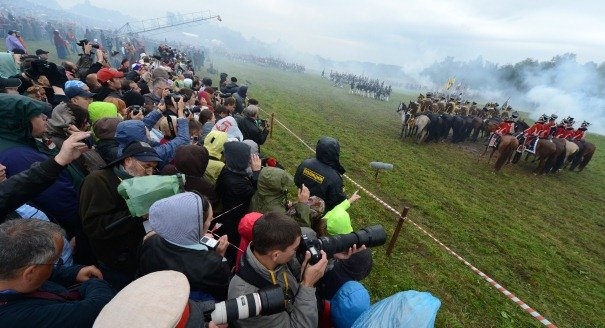In early September, a couple of thousand soldiers representing the armies of Napoleon and the Russian Field Marshal Mikhail Kutuzov, reenacted the battle of Borodino just outside Moscow. Meanwhile, several dozen Cossacks are riding from Moscow to Paris to celebrate what the Russians call their “Patriotic War.” This saw Kutuzov’s retreat from Borodino, Napoleon’s entry in Moscow, the great fire that virtually destroyed the Russian capital, and the French Grande Armée’s unhappy march back to the Russian border, during which it nearly perished. The war in Russia lasted exactly six months, and was followed by Russian forces campaigning in Europe for another eighteen months during which time they eventually reached Paris. The Cossacks camped on the Champs-Elysées and endowed the French language with the word bistro, literally meaning quick. They were constantly on the move.
The Kremlin has played up the anniversary of the event true to its quest for historical underpinnings for Russian self-identity. Vladimir Putin went to Borodino to watch the reenactment, and Dmitry Medvedev opened a museum next to Red Square. The last time the celebration of the 1812 victory was held in Russia on this scale was 100 years ago. The Patriotic War of 1812 was then eclipsed, first by the revolution of 1917, and then by the Second World War—the Russian segment of which is now known within the country as the Great Patriotic War. Putin is now evidently reaching beyond the twentieth century. In November, he is sure to mark the 400th anniversary of the departure of the Polish troops from Moscow. Apart from Napoleon’s forces, Polish troops were the only ones in the West to have ever controlled Moscow’s red-brick fortress. And, as Medvedev remembered, 2012 also marks the 1150th anniversary of the founding of the Russian state.
A lot to remember— and something to celebrate. Historical events of this kind, however, have a clear foreign policy angle. This month at Borodino, Putin chatted with Valéry Giscard d’Estaing, France’s former president and a special guest at the party. Just before that, the Red Square festival of military bands featured Mireille Mathieu singing both La Marseillaise and the Russian national anthem. The French military band from Metz were the first group to perform at that event. By 1912, when Czar Nicholas II officiated at the Patriotic War centenary event, Russia and France were not only allies, but fully reconciled. War between the two of them appeared inconceivable. All the way through the Cold War, and certainly since de Gaulle’s times, France and the Soviet Union had what might be described as a privileged relationship.In the first half of the twentieth century Russia’s principal battlefield enemy was Germany. Victory in the Great Patriotic War is still celebrated as the truly national holiday. The Soviet Union lost about 28 million people in that war and most of the European portion of the country was destroyed. After the war, Germany was occupied, and then divided between the victors. It was the fall of Communism and the dismantlement of the Soviet empire that precipitated the reunification of Germany. Today, Germany is not only Russia’s most important economic and political partner in Europe, but also perhaps Moscow’s most valuable friend in the West. The relationship, incredibly, has become virtually fully reconciled. Germany and France have formed something which might be called a security community with Russia: any possibility of using military force is completely and securely out of the relationship.
Although it was almost totally overshadowed by the Pussy Riot scandal, the Russian Orthodox Patriarch’s first-ever visit to Catholic Poland last month was an event of truly historic proportion. The two churches have issued a joint plea for reconciliation between Russians and Poles. This takes a process which began a few years ago to a new deeper level, building on the symbolism of Putin kneeling at the Katyń memorial to the Polish officers and civilians killed on Stalin’s orders. Other recent developments in the Russian-Polish relationship have included the tragedy of the Polish President’s plane crash near Katyń in 2010 and the controversy it then raised in Poland, which complicated but did not stop the Polish-Russian reconciliation process. When this process is complete, the security community in Europe will be given a massive boost—similar to those that post-Second World War Franco-German reconciliation and the more recent German-Polish reconciliation have produced.
Piece by piece, Russia and its neighbors are dealing with the issues inherited from history. Sweden, an ancient arch-enemy and a wary Cold War-era neutral state has virtually stopped worrying about the age-old Russian threat. Finland, which fought two wars against the Soviet Union, lost some territory and was ambivalent about Moscow’s influence in the country, has become relaxed about Russia. Turkey, which fought about a dozen wars against Russia over two hundred years, and was actively involved in the Cold War, has now become a major trading partner and one of the most favorite holiday destinations for millions of ordinary Russians who flock to its Mediterranean coast each year. To all intents and purposes, Turkey and Russia are real partners in security community-building.
This all points to a new fabric being woven in Europe, where conditional and tentative peace between Russia and other countries in Europe, brought about by the fall of Soviet Communism and the end of the Cold War, is being replaced by much more durable relationships which eschew war forever as an instrument of policy among the countries concerned. The job is not done yet. There is the Baltics; there is Georgia, whose five-days-war with Russia is only four years old; and there are historical issues with several others. However, the trend is unmistakable: Russia is well on the road to establishing stable peace with others in Europe. History is not coming to an end, but war between Russians and other Europeans is definitely becoming history.
